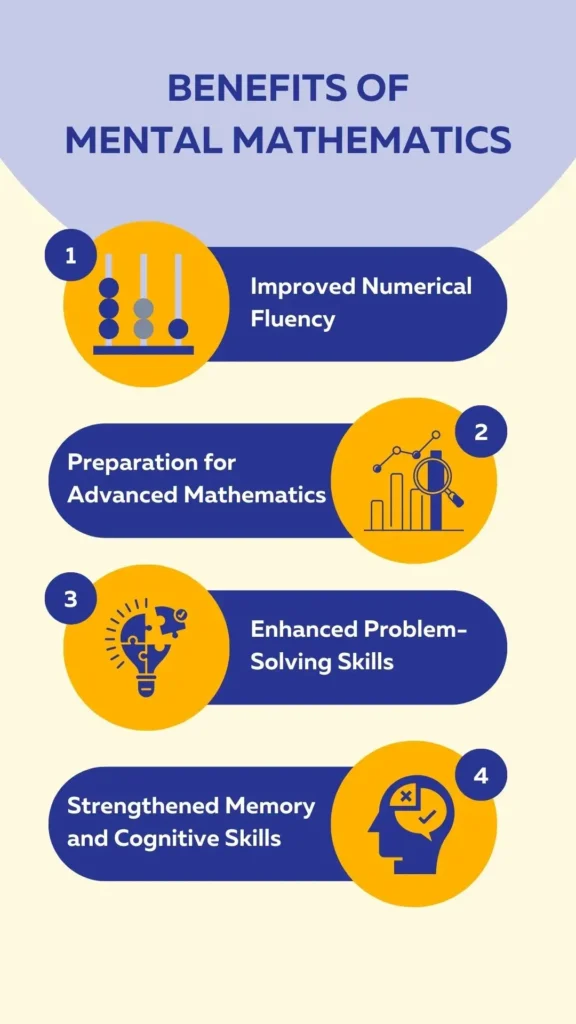How Mental Math Enhances Your Core Mathematics Abilities
- Schools
- December 13, 2024
- Viva Education

Rohan was at the vegetable market with his mother. The vendor said, “Three kg of potatoes at ₹25 per kg and two kg of tomatoes at ₹30 per kg—how much will it be?”
Before his mother could pull out her phone calculator, Rohan confidently said, “₹135!”
The vendor smiled, impressed, and his mother beamed with pride.
This simple moment demonstrated the power of mental math—to solve problems, strengthen core math skills, and build confidence in everyday situations.
This article explores how mental math builds confidence, sharpens mathematical abilities, and helps kids quickly tackle everyday problems.

Why Mental Maths Matters Now More Than Ever
Nowadays, when we think about maths, what comes to mind is where my calculator or my smartphone is. And it raises a concerning question:
Do we need to gain the skill to do quick mental calculations?
Mental math isn’t just about quick calculations.
Mental math builds math fluency, sharpens cognitive agility, and lays a strong foundation for advanced mathematical skills.
Let’s break down why this matters for elementary students.
Benefits of Mental Mathematics

- Improved Numerical Fluency
Think of mental math as the backbone of math fluency.
When students can add, subtract, multiply, or divide in their heads, they solve problems faster and more confidently.
This fluency makes them better equipped to handle exams, competitive tests, and even practical situations, as Rohan did at the market.
- Preparation for Advanced Mathematics
Mental math builds number sense, which is essential in understanding higher-level math.
Kids who master basics like addition and multiplication in their minds find it easier to tackle fractions, algebra, and geometry later.
It’s like building a sturdy bridge before crossing a river.
With mental math, students aren’t just memorising formulas but thinking mathematically.
- Enhanced Problem-Solving Skills
Mental math forces kids to analyse problems from different angles.
For example:
“How can I quickly calculate 29 x 5?”
A student might break it into:
(30 x 5) – 5 = 145.
This fosters logical reasoning and creativity—essential skills for tackling complex problems.
- Strengthened Memory and Cognitive Skills
Solving math mentally boosts memory and enhances brain flexibility.
Students practice holding numbers in their heads, manipulating them, and finding solutions—all of which strengthen their working memory.
In the long run, this leads to better academic performance across all subjects.
Mental Math and Core Mathematical Abilities
1. Mastering Basic Arithmetic
Just as cells are the building blocks of our body, addition, subtraction, multiplication, and division are the building blocks of mathematics.
Mental math helps students internalise these operations, making them second nature.
It’s like learning to ride a bike: Once the basics are locked in, kids can move on to more challenging terrains.
2. Developing Number Sense
Mental math promotes an intuitive understanding of numbers:
- Is 487 + 145 closer to 600 or 700?
- How can I split ₹150 equally among four people?
These quick estimations build confidence and make students better decision-makers in real-world scenarios.
3. Building Logical Reasoning
Mental math encourages kids to think logically and spot patterns.
For instance:
“What’s 25 x 16?”
Instead of multiplying directly, a student might think:
(25 x 10) + (25 x 6) = 250 + 150 = 400.
It’s not just math—it’s strategic thinking.
4. Connecting with Other Math Concepts
Mental math doesn’t stop at numbers.
It integrates with concepts like fractions, percentages, and even geometry.
When children learn to find 15% of 200 mentally, they connect math to shopping discounts, bank interest, and daily life.
How to Improve Mental Maths?
Kids can build confidence and sharpen their math skills by practising regularly and using fun techniques. Here’s how you can make mental math engaging and effective:
1. Start Simple:
- Practice skip counting (2, 4, 6…).
- Break numbers into manageable parts: For example, solve 36 + 47 as (30 + 40) + (6 + 7).
2. Progress Gradually:
- Introduce multiplication shortcuts, like splitting 15 × 12 into (15 × 10) + (15 × 2).
- Practice percentage tricks, such as calculating 10% of ₹150 by dividing ₹150 by 10.
Let’s Try It!
Can you calculate this quickly in your head?
- What’s 25 × 8?
- How much is 15% of ₹600?
3. Tools and Resources
Use fun tools to make mental math practice exciting:
- Educational Books: Educational Books: Engaging educational mental maths books, such as Viva Speed Maths, simplify mental math by incorporating real-life problem-solving, puzzles, and exercises, making learning both fun and effective for students.
- Flashcards: Quick drills to test addition, subtraction, or multiplication.
- Math Apps: Platforms like MentalUP and Mathletics offer interactive challenges.
- Puzzles and Games: Sudoku, card games, and math board games make learning enjoyable.
4. Creating a Mental Math Routine
- 10 Minutes a Day:
Dedicate a small chunk of time daily to mental math practice. Consistency matters more than duration. - Real-Life Scenarios:
Involve kids in everyday math tasks:
• “How much will three pencils cost at ₹12 each?”
• “We’re going to a bookstore. If one book costs ₹150, how much would three books cost?” - Your Turn!
Can you figure out which is a better deal:
• Three pizzas for ₹600, or 2 large pizzas for ₹450?
Help Your Child Master Mental Math!
Imagine your child solving math problems quickly and confidently—no pen, no paper, just their sharp mind! Viva Speed Maths from Viva Education is a thoughtfully designed series that makes mastering mental maths achievable and enjoyable. Aligned with NCERT guidelines, it equips students with practical strategies to approach maths with confidence and efficiency.
You might be asking yourself, But how? Isn’t it challenging to make maths engaging and keep children’s attention in the first place?
This series is designed specifically to address those concerns:
- Step-by-Step Confidence Building:
Students start with more straightforward problems to build their confidence, progressing to more challenging tasks that keep them engaged and motivated. - Designed for Every Need:
Perfect for revision, homework, or enrichment, the series easily adapts to every learning requirement. - Engaging Visual Content:
Packed with diagrams, graphs, and illustrations, it simplifies complex concepts and keeps learners interested. - Sharpens Logical Thinking:
The exercises go beyond rote learning, helping students develop problem-solving skills and logical reasoning. - Aligned with the Curriculum:
Developed to reflect the latest primary education trends, the series ensures students are well-prepared for academic challenges. - A Learning Experience That Lasts:
The series uses proven teaching techniques to ensure that students not only understand concepts but retain them for long-term success.
Start your child’s journey to mastering mental maths for Classes 1 to 8 today. Visit Viva Education for free samples and start your child’s mental math journey today.
The Takeaway
Mental math is a life skill.
It builds confidence, strengthens critical thinking, and makes math fun.
Like Rohan at the market, kids can face any challenge when their core math skills are strong.
Start practising today because a strong foundation in mental math paves the way for success—in academics and beyond.



